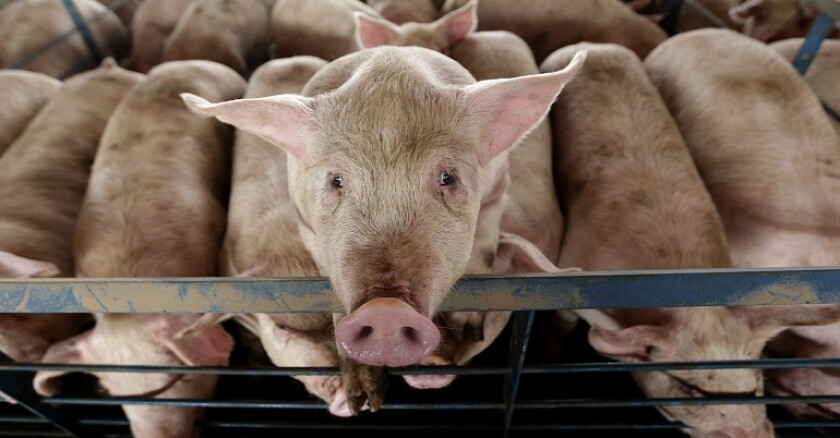California voters approved what advocates say are the strictest animal protections in the world.
Although Proposition 12 is intended to improve conditions for animals raised for meat and eggs, it pitted two of the nation’s leading animal rights groups against one another.
The initiative bans the sale of meat and eggs from animals confined to areas that don't meet minimum space requirements. By 2020, calves will be entitled to 43 square feet each. Breeding pigs will be given 24 square feet. Egg-laying hens will get one square foot and need to be cage-free.
All of this will “significantly reduce the suffering of millions of animals and make food safer for California families,” said Chris Holbein of the Humane Society, the leading sponsor of the proposition.
But People for the Ethical Treatment of Animals (PETA), and several other animal rights groups, joined the opposition to Prop. 12. PETA argued the measure would be a step backward for animals, codifying harmful practices and giving consumers the false impression that they can buy animal products ethically under the new regulations.
“Humane labels make consumers feel good about their decisions but perpetuate cruelty to animals,” said PETA’s Lindsay Dadko. “It is not and never will be humane to confine birds to one miserly square food of space. Cruelty is cruelty is cruelty, and it doesn't matter what label you put on it.”
The vote will now shape the international conversation about the economics and ethics of eating animals. The debate over Prop. 12 comes amid a “huge sea change in the interest in plant-based foods and animal rights,” said Dadko. It’s part of why she believes Californians -- and Americans more broadly -- are ready to make bolder changes instead of taking incremental steps.
Veganism is becoming more mainstream among celebrities and other “influencers.” But a recent Gallup poll found that just 3 percent of Americans identify as vegan, compared to 2 percent in 2012.
Still, some progressive activists believe a movement against meat and animal products will have its day.
Sean McElwee, the New York-based activist who recently popularized the movement to dismantle the U.S. Immigration and Customs Enforcement agency with the slogan “Abolish ICE,” has been tweeting for years about how meat could be the next big culture war. He wants to see an end to federal meat subsidies, driving up the cost of animal consumption. (According to California’s nonpartisan Legislative Analyst’s Office, Prop. 12 will likely spike prices for meat and eggs.)
“We should see meat in much the same way as we see oil and gas,” McElwee said, “as a pollutant to be destroyed.”
Yet McElwee isn’t vegan himself. He said the diet can be hard to maintain, especially if your access to vegan groceries and restaurants is limited. But he does imagine his children will judge him, should he have kids someday: "My dad's cool. He opposed ICE. But he ate meat like a fascist."
Prop. 12 was essentially a redo of a 2008 California ballot measure, which mandated that confined farm animals be able “to lie down, stand up, fully extend their limbs and turn around freely.” That measure passed, but the language proved to be too vague. It failed to set specific square-footage requirements, so the farming industry took liberties, and critics now say greater enforcement is needed. According to The Los Angeles Times, two-thirds of California's egg-producing hens are still kept in cages.
The leading campaign that supported Prop. 12 was the Humane Society’s Prevent Cruelty California, which raised $6.12 million, according to the latest updates on Ballotpedia. By contrast, Ballotpedia reports that the opposition committee Californians Against Cruelty, Cages, and Fraud raised just $550,000.
Other supporters included Sierra Club California, the Center For Food Safety and the California Democratic Party. In addition to reducing harm to animals, they say the measure will reduce the odds of consumers getting food-borne illnesses.
Other opponents included Friends of Animals, the Humane Farming Association, the National Pork Producers Council and the Association of California Egg Farmers.
"It's sad," said the Human Society's Holbein, "to see animal groups take the side of the factory farming industry that profits off of keeping animals in cages so small they can barely move."
For results of the most important ballot measures, click here.








